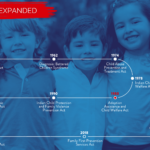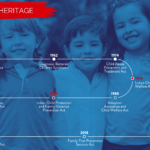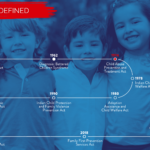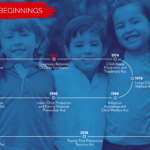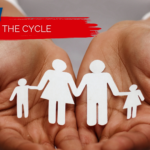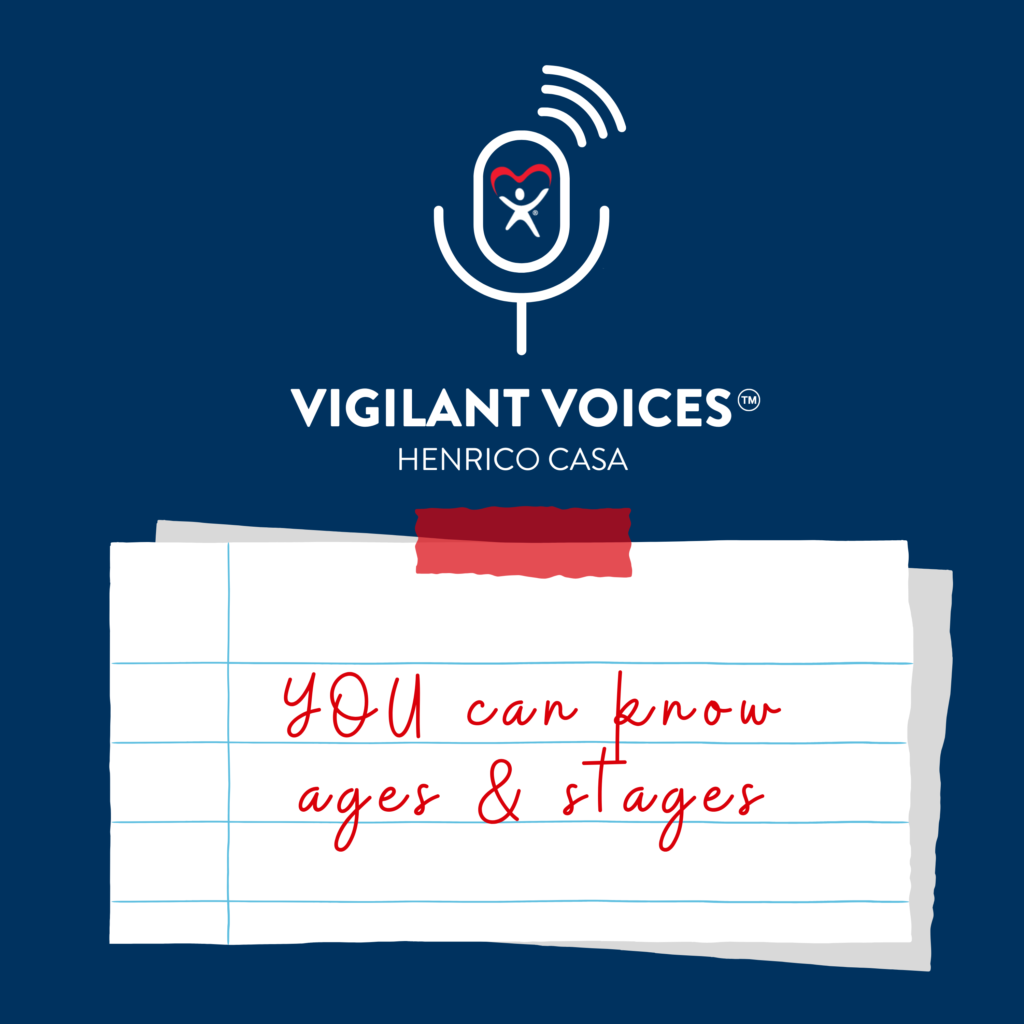
Listen to Episode 7 of the Vigilant Voices™ podcast, YOU Can Knows Ages & Stages.
Jeannine Panzera: Hello, listeners. We’re glad to have you listening because, well, we know you’re just as passionate as we are about the well being of children.
Kristin Blalock: Yep. It’s too bad we can’t all just be, like, chatting together, because I love connecting with people who want to make a difference. Just feel like we’re all bombarded with negative stories every day. So it’s really refreshing to engage with people like you, Jeannine, who are lights in our community.
J: Well, thank you. And right back at you on that. But yes, when we can focus on knowing about the challenges facing children and families, so we ensure that no child faces abuse, neglect or trauma. That’s really important and that gives us hope. And so in this episode, we’re going to talk a little bit about understanding child development and what we call ages and stages. We’re going to talk about this because in our work at CASA, we’ve learned that sometimes a lack of understanding about child development can actually be a risk factor for abuse and neglect.
K: Yeah, and whenever we talk about typical milestones, it always begs the question, and I know this is for sure a question I’ve had as a parent, but what do I do if a child is not hitting the milestones?
J: Right? And I think we can definitely talk about that. But you’re killing me. Don’t we have a CASA story first?
K: Of course. Okay, so everyone please meet a precious toddler who we’re going to call Eve. Eve was born with a disorder that significantly impacts her development. For instance, she uses a wheelchair for mobility.
J: And correct me if I’m wrong, but if I’m remembering, I think when Eve’s CASA volunteer met her, she was really malnourished.
K: She was. It just breaks my heart because she was so underweight. So much so that she wasn’t even near the first percentile of that growth chart that all the pediatricians use that monitors development. And it was just heartbreaking because if Eve had been receiving the care she needed, she could have been on a much healthier path. There were medications and therapies that were available to her. A feeding tube definitely would have helped provided the nutrition that she clearly wasn’t receiving. And I guess to simplify what’s really a complicated situation, I think Eve’s mom didn’t seem to know the typical ages and stages of development for a child, let alone a child like Eve who had specific needs.
J: Right. And I think that’s potentially even more difficult when we have a child with some special needs. But I think when we have kids with developmental delays or special needs, we have to lean into those to understand what those issues are. And I think in this particular case, mom wasn’t willing or able to learn to accept those needs. And so then we ended up in a situation of physical and medical neglect in this case.
K: For sure. And I guess to put this out there before we go any further, let’s be clear that no children are alike, but in general, they do tend to follow a similar sequence of growth and development. And I think if we don’t understand what to expect of them at those various ages and stages, then we really can overlook a need that they may actually have.
J: And we have to keep our expectations in check. Because it’s easy to become frustrated with a child if they aren’t doing what you expect them to do. And so this is why our kids with mental or physical disabilities have a higher risk of being abused or neglected than other children. And the inability of their parents potentially unrealistic expectations can actually then be a trigger.
K: Yeah, for sure. And a child’s behavior is influenced by their needs. So in order to understand what behaviors you’re seeing and to kind of respond appropriately, you do need a baseline understanding of their needs.
J: So let’s maybe start walking through what we would call “typical” stages of development. Of course, we would encourage everyone to make sure that you’re talking with a child’s pediatrician and any medical providers, but we’re going to stay at a high level so we can try to touch base on all of the different stages in the episode. And so in doing so, we’re going to try to highlight maybe what we would call typical behavior or expectations and then potentially where we often see things maybe go down a more negative path. So let’s just start right at the beginning. Kristin, you love these little ones, our newborns.
K: Oh, I do love them, but I value my sleep enough to not really need one back in my house.
J: Okay, but I know that you love those little newborn snuggles, and just when they wrap their little hands around your finger.
K: They’re so sweet.
J: Yes, but what’s interesting about newborns is that even though they’re very new and vulnerable, they can also be very responsive. And so there’s been a lot of research and studies that newborns respond to smell, to touch, to voices they can actually see up close. If you see or spend time with any new baby, they move their little heads from side to side. They smile, they cry, they coo. But crying is their way of voicing a need because they can’t yet use words.
K: And when we respond to that need, like, right away, whatever it is, it just they calm immediately.
J: Right. And the biggest need at this stage, in addition to potentially some more obvious things, they need to be fed, they need to have their diapers changed, really is the beginning of developing what we call healthy attachments and comfort and security.
K: As they transition from that early newborn to more of an infant stage, that need for comfort and security carries over. Physically, they’re gaining strength .They’re starting to move more of their bodies or hopefully progressively more coordinated. So they’re sitting and crawling and maybe even walking. They start to respond to their name and form words, which is always so fun, right?
J: And they’re learning trust because they’re getting those responses.
K: They’re unknowingly cycling through that attachment cycle where they’re voicing a need to signal their discomfort. Wet diaper, I’m hungry, whatever it may be. And then their parent or caregiver is satisfying that need, which then signals comfort to the baby.
J: Exactly. And we’ve, I think, both used the word attachment a couple of times, but what that means is both an emotional and psychological connection and ideally, it’s formed with a child’s primary caregiver at this young age, because if it isn’t, attachment, if it’s disrupted ,can be very difficult to try and get on a more healthy path later in life.
K: It is. And we see that with children whose families kind of lacked permanency or stability early on or like you said ,when a family was disrupted at this stage.
J: Exactly. Okay, we’ve talked a little bit about that newborn to infant stage of what’s really important. And then we have the toddler stage.
K: Which is exhausting.
J: Yes. But it’s fun too, right? It’s full of that activity of learning to walk and jump and climb, holding crayons, stacking blocks. They’re gaining and learning a whole lot of skills. They’re mastering tasks, they’re building blocks for new skills that they’re going to be learning, gaining independence .And at this stage, we hope that they’re also starting to put words into short sentences and then can follow relatively simple instructions about go get your shoes.Right?
K: And the key there is simple, right? I think this is a stage where caregiver expectations can be higher than what’s realistic. Like go get your shoes is great, but maybe giving them two step instructions like ‘go get your shoes, bring them back to me and put them on” like their little brain, little overwhelming process. It’s important to remember that we want to set them up for success at this stage because success will drive their independence and autonomy. And when they feel failure, especially over things that they definitely can’t even do, it really leads to shame and doubt in their little minds.
J: Right. They don’t really understand why they’re upset or what’s happened, but they don’t feel good. And so what we don’t want that, but what we want is to help our kids develop into the most positive and competent version of themselves that they can be. And so especially as they enter preschool, so that’s when they’re starting to refine those motor skills so they can do some more independent things like draw or play on the playground, dress themselves. They’re starting to assert themselves more in this stage.
K: Right. Which again is what they’re supposed to do. But it can be frustrating.
J: Right? Because you are trying to reign them in and they are trying to go. But we do want them to learn to assert themselves so that they learn to voice their needs and wants as they grow and mature. I mean, we talked about some of that self advocacy a few episodes ago and so that’s true for our kids. And as they become school age. And they’re then adjusting to even more demands from academic perspective, from social relationships. And so we want to have helped them develop those vital skills from that kind of birth to let’s say, four or five, so that they feel capable, responsible and independent in classroom settings.
K: Sure, but while still being kids. This is a common stage when in our work at CASA, we often see families struggling because parental problems weigh on a child. So when the parents are struggling with something, when there is a trigger or a challenge within the family, it really does strain the kids and make them grow up a little quicker than they should be expected to. For example, we see young children who are left to be caretakers for their even younger siblings because a parent isn’t present or able to parent in that moment.
J: Right. And then we’re sort of stealing that childhood from the child who is caring for and they deserve their childhood. We want to give children opportunities to learn responsibility and learn independence, but at that age appropriate level.
K: Yeah, totally agree. The experiences need to be offered to children that fit their stage and maturity level. And those experiences or challenges, the things that push them to grow, should ideally be balanced with other experiences that are showing the child that they’re loved and valued and wanted. And that no matter what you believe in them.
J: Exactly. And that continues into that pre adolescent and adolescent stage. At this stage, we have our preteens and teens that really are developing a sense of self, their own identity. They’re starting to think about who they are now, where they want to go, who they want to be as they grow older…
K: And who they want to be and where they’re going might not fit in with what their parents thought or expected. And so that’s another scenario where at CASA we often see conflict and potential for abuse.
J: Yes. And at all of these stages, it seems that the situations that we see at CASA that end up escalating to abuse or neglect really kind of boil down to maybe unrealistic expectations or inability to accept certain circumstances.
K: That was definitely true in Eve’s story that we started to share with you all. Eve’s mom had unrealistic expectations of her needs and development. And I don’t know, she was either unwilling or unable to face the severity of Eve’s needs. So when CAS got involved and when Eve was moved into a supportive foster home, it really jump started her growth and development. Her CASA saw significant improvements as she received a feeding tube. She was prescribed the appropriate medications. She started participating in occupational therapy. In a relatively short period of time, she was clearly so much healthier. She became more responsive. She was like, starting to communicate with her hands and then it led to her vocalizing. And she’s now in a special needs preschool. And her CASA volunteer and other professionals are even starting to research and pursue eye gaze communication tools, which is amazing.
J: That’s amazing. And what an awesome turnaround for this little one. And whenever you share these stories, I remember them and I remember her CASA volunteer telling me how much Eve lights up when she gets a visitor. So her potential might be different than her peers, but she deserves and is now getting the opportunity to meet that potential to the best of her ability.
K: Oh, yeah, without a doubt. As we said, obviously no child is the same and growth isn’t necessarily linear. But children develop at varying paces and they can sometimes regress in different areas, especially when they’ve experienced trauma.
J: And because no child is the same, it can be challenging to identify if a child has a need, or let’s say as a parent, your expectations about their stage of development maybe is off because you’re comparing to other children that were on a different path. Yeah. So it’s really important that when you’re interacting with a child, whether it’s a parent caregiver, coach, volunteer, really anyone, that you do take the time to familiarize what is typically appropriate for certain ages and stages.
K: Because I think if we know what is typical or expected, then you’re going to have a better understanding of what’s not. And that leads right into our call to action for this week, which is to simply check yourself. Check what you’re expecting of a child. Is your expectation rooted in a typical stage of development? If so, then maybe this child needs more support to continue developing in a healthy way. Or is it your expectation and not the child that needs adjusting? Make sure you’re not putting too big of a burden on a child. Make sure you’re not setting yourself up to just become overly frustrated when they aren’t capable of what you’re expecting of them.
J: Exactly. And so that, I guess, as the follow up, is making sure then that it’s not creating an environment that could trigger abuse or neglect. Because if we don’t know or if we’re even ignoring, that’s not good either. So if you need help in this area, the good news is that there are so many resources available. And in our cases, we often recommend services such as parenting classes or parent coaching to help caregivers learn how they can better meet their child’s needs at whatever age or stage they are.
K: That can be so helpful. And I’d also recommend early intervention services. I know we’ve tapped into this in my own family. A child can be evaluated and potentially receive free professional support and services through Virginia’s Early Intervention Program. So I’ll put the link to that in our show notes because it is really helpful.
J: That’s fantastic. And if you enjoy this episode, we often post content on our blog related to these types of topics, and so we would encourage you to check those out at any time.


